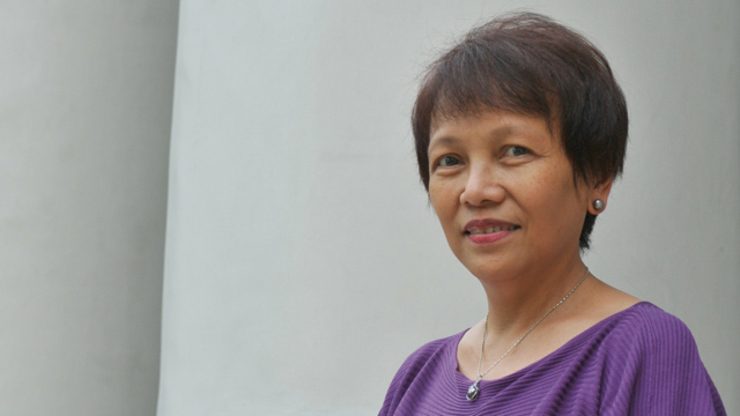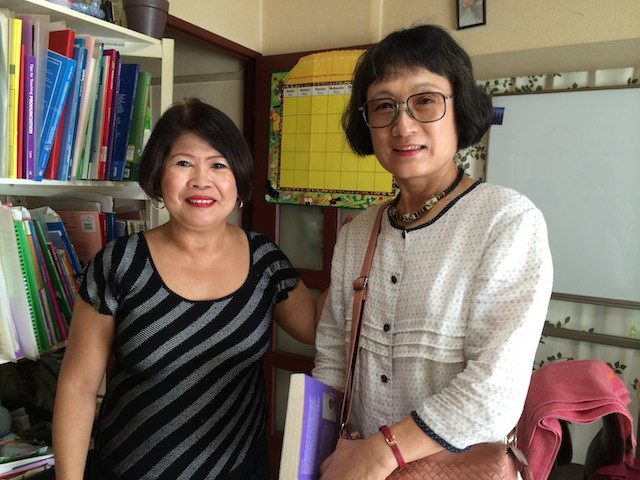SUMMARY
This is AI generated summarization, which may have errors. For context, always refer to the full article.

KYOTO, Japan – Susan de Ono-Laset, with her foreign-sounding surname, is as Filipino as anyone can be. She hails from San Pablo, Laguna, buys a bento meal of mongo and fried chicken from a Filipino bar in Nagoya, and lays out a futon in her downtown flat for a stranger (me) introduced by a common friend by e-mail.
But there’s an oddity about her: she has been living in Japan for over three decades, an unusually long time to live in a country lukewarm towards migrant workers. She is probably the first Filipino to have completed paying work pension in Japan.
Since the late 70s, Susan has been teaching English, brought to Japan by the YMCA. The only Filipino in a group of about 25 foreign nationals, she began her pioneering work, spreading the gospel of English — grammar, conversation, and phonetics — mainly to Japanese adults. When the YMCA closed shop, she taught employees of big companies, signed up with schools and, until a few years ago, opened her own, Susan’s World of English, in her compact apartment.
At 62, she is onto another venture. She and other Filipinos are starting a school for children, English World i-speak, in Nagoya. The novel thing here is the English bar: starting at 6 p.m., the school turns into a bar where adults who want to practice English pay 2,500 yen for a drink (approximately P1,250) and an hour of conversation.
Here, in Susan’s and her colleagues’ work, is a potential for Filipino English teachers. Imagine the Japanese speaking English with a neutral accent, neither British nor American. Could this be the Philippines’ contribution to the world’s third-largest economy?
With the preparations for the 2020 Tokyo Olympics, the Japanese government has been aggressive in promoting tourism, relaxing visa requirements for Southeast Asians, including Filipinos. Closely linked to tourism is the ability of its people to communicate in English. Japan has perfected the hard infrastructure, from shinkansen to toilets to vending machines. But it is severely wanting in a major software, speaking in English.
Manuel Lopez, our ambassador to Japan, acknowledges this need—and he is not alone. Immediately after the March 2011 earthquake and tsunami that struck an area of Japan, Lopez relates, “alarmed by the heavy airline and hotel cancellations, the MOFA [Ministry of Foreign Affairs] appealed to the diplomats in Tokyo to persuade their respective countrymen to visit Japan. During the open forum, many of us complained about the difficulty tourists experience in moving around Japan with most of the signs in Japanese and very few English-speaking people. Even the menus in restaurants were mostly in Japanese.”

In reaction to this dialogue, Lopez says that the Japanese government mandated the learning of English in grades 5 and 6.
The private sector in Japan has forged ahead. In 2012, the company that owns the global clothes store Uniqlo made English its official language for business. It joined big companies like Rakuten, Japan’s leading online retailer, and Nissan in blazing this trail.
Discrimination
There are issues to thresh out, though, in treading this new path, in encouraging Filipinos to come over and partly colonize the Japanese tongue.
First is the attitude toward non-native English speakers. As Susan’s experience shows, discrimination against her and other non-native speakers has somewhat ebbed. In the past, she fought a lonely battle. While teaching part-time in a conversation school, she was asked to tell her students that she was not from the Philippines. She quit right there and then.
In another incident, she was interviewed over the phone and got the job. When Susan showed up, the employer was miffed, apparently expecting a foreigner. After making her wait for what seemed like eternity, Susan was told that the class was cancelled and that they would call her. Of course, the call never came.
Today, the signs are still there. “The sad part is non-native speakers are hired at a lower salary bracket. Apart from that, they are usually assigned to far-flung areas where native speakers refuse to go,” Susan says.
Related to this is the manner of hiring. “English teachers are hired by employment agencies or hakken kaishas,” Susan explains. “It’s almost impossible to get directly hired by a regular school. Hakken kaishas supply ALTs or assistant language teachers to public and private schools under the Japanese Board of Education (BOE). The hakken kaisha is paid by the BOE so there is no employer-employee relationship between the teachers and the BOE. Most teachers are hired on a contractual basis so they do not get health or pension benefits.”
JPEPA?
It would be a long shot to include the hiring of English teachers in the JPEPA or Japan-Philippines Economic Partnership Agreement. “It may be difficult as changes in a treaty will need Senate concurrence,” our labor attaché in Tokyo Luz Talento says in an e-mail. “I am sure the Japanese side will view this proposal as an amendment to the treaty since only nurses and caregivers are covered in the movement of nationals at the moment.”
Talento, however, points out that they are able to “process the entry of English teachers to Japan under the skilled visa.”
In the 1970s, Filipino bands, mostly male, entertained Japan with jazz and rock and roll music. This gave way to female entertainers and bar hostesses in the 1980s but was heavily curtailed starting about 2004 when the US listed Japan as a country that trafficked women in forced labor. After the signing of the JPEPA in 2006, employment of nurses and caregivers was given a vigorous push.
Given the confluence of events — the 2020 Tokyo Olympics, the stepped-up tourism drive, the radical step of some companies to adopt English as their official language — a new opportunity could come the way of our young English teachers. – Rappler.com
Add a comment
How does this make you feel?





There are no comments yet. Add your comment to start the conversation.